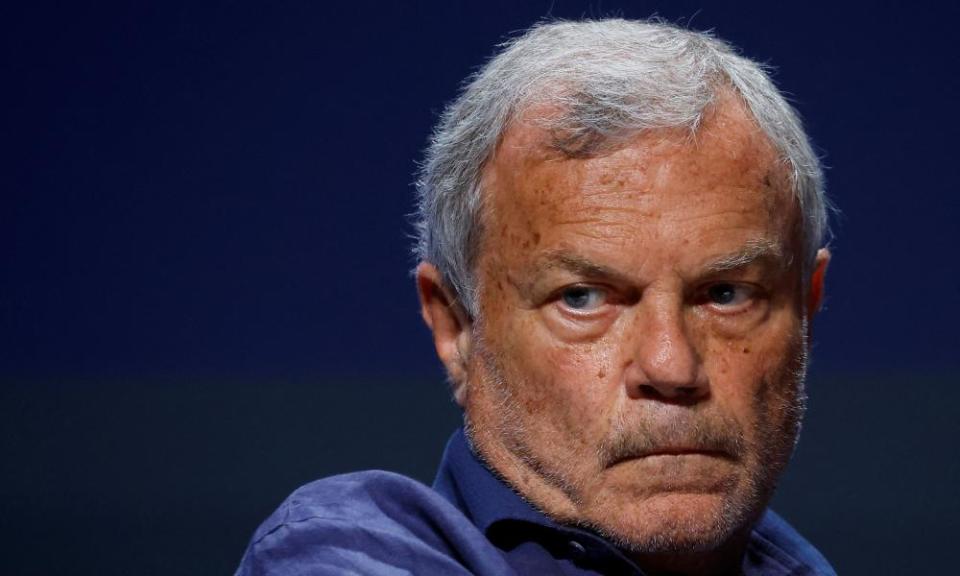S4 Capital’s share slump means Sir Martin Sorrell has a crisis on his hands

It was “unacceptable and embarrassing”, said Sir Martin Sorrell in May, when the advertising firm S4 Capital finally announced its full-year numbers for 2021, that publication had been delayed twice. He could hardly say anything else. S4 is his fast-and-furious post-WPP comeback vehicle and he had just given investors a mighty scare over its ability to manage rapid growth – 29 agencies bought since launch in 2018.
Still, on the bright side, the 2021 numbers contained no nasties. By generating £687m in revenue, the company had almost doubled in size in its third full year. The finance operation would be “upskilled”, said Sorrell. The long-term goal of assembling a large and global digital-only advertising agency was intact.
And now this: a thumping profits warning on Thursday that sent the share price crashing 46%. Growth still isn’t the problem – but controlling overheads is. The statement cited “significant investment in hiring and consequent expansion of the cost base” as the reason why top-line earnings for this year are now forecast to arrive at £120m, versus the £160m-ish expected by the market.
Related: Shares in Martin Sorrell’s S4 Capital halve as staff costs hit earnings
The difference may not sound huge but, after the debacle with the delay in last year’s numbers, S4 was low on credit with the outside world. At 121p, the share price is now virtually back to where S4 started out. As recently as September 2021, it was 800p and S4 was worth £4.5bn, prompting some observers to wonder if WPP (value: £9.3bn) could be overtaken eventually.
Forget comparisons with WPP. The question now is how the collapse in the share price damages the roll-up strategy. Since Sorrell has already ruled out issuing equity below 425p, deal-making is presumably off the table. What’s more, past equity-share arrangements with digital-native founders who have hitched themselves to S4’s wagon may become more expensive to satisfy. The whole “co-owner” setup works best when the shares are fluttering gently upwards.
Sorrell himself will not lack motivation to restore the market’s faith in the great adventure. He and his deputy Scott Spirit have a five-year incentive scheme that would pay them 15% of the market value created from S4’s launch, subject to a 6%-a-year hurdle.
At the 800p peak, the potential prize was estimated to be worth a cool £500m to the duo. After the plunge in the shares, the figure is probably zero, an outcome Sorrell might also describe as unacceptable and embarrassing. He has a crisis on his hands.
Markets may test dithering ECB
The Bank of England gets it in the neck for being late to start raising rates to fight inflation but, by comparison with the European Central Bank, it almost jumped the gun. One can view the ECB’s half-point increase on Thursday – double the quarter-point promised only last month by its president, Christine Lagarde – as an admission that the process should have started sooner.
Related: European Central Bank raises interest rates for first time in 11 years
One understands the reasons, of course: fear of recession, compounded by the threat to energy security after Russia’s invasion of Ukraine. Even so, the rise only brings the deposit rate to zero, which is hard to square with eurozone inflation at 8.6%.
Now a fresh threat has arrived in the form of a surge in bond yields, and thus borrowing costs, for a few financially weaker eurozone members. Italy, now without Mario Draghi as its prime minister, tops that list – its yields are 2.3 percentage points above Germany’s. The gap is uncomfortably wide, but is it wide enough to prompt Largarde to wheel out the ECB’s new bond-buying weapon, the “transmission protection instrument”?
As usual, the precise circumstances for activation were left deliberately ambiguous; market movements would have to be “unwarranted” and “disorderly”, which could mean anything.
In past episodes of eurozone debt crises, markets have not waited long to test the ECB’s true intentions. It’s hard to see why this time would be different when the central bank has shown itself to be indecisive in its main job of setting interest rates.
M&S wingman hits eject
The new top trio at Marks & Spencer would be “flying in formation”, declared the chairman, Archie Norman, in March. Not for long, they won’t be. Rather than reach for the skies, wingman Eoin Tonge, aka the finance director and chief strategy officer, has pressed the eject button. He’s off to AB Foods, owner of Primark and various sugar, ingredients and agricultural businesses.
As a career decision, it’s understandable: ABF, worth £13.3bn, is a relative jumbo jet compared with M&S’s £2.8bn. But the M&S fly-past is now more dependent than ever on harmonious relations between Stuart Machin and Katie Bickerstaffe, the twin chief executives. To put it gently, other companies have found the double-act formation hard to sustain.

 Yahoo Finance
Yahoo Finance 